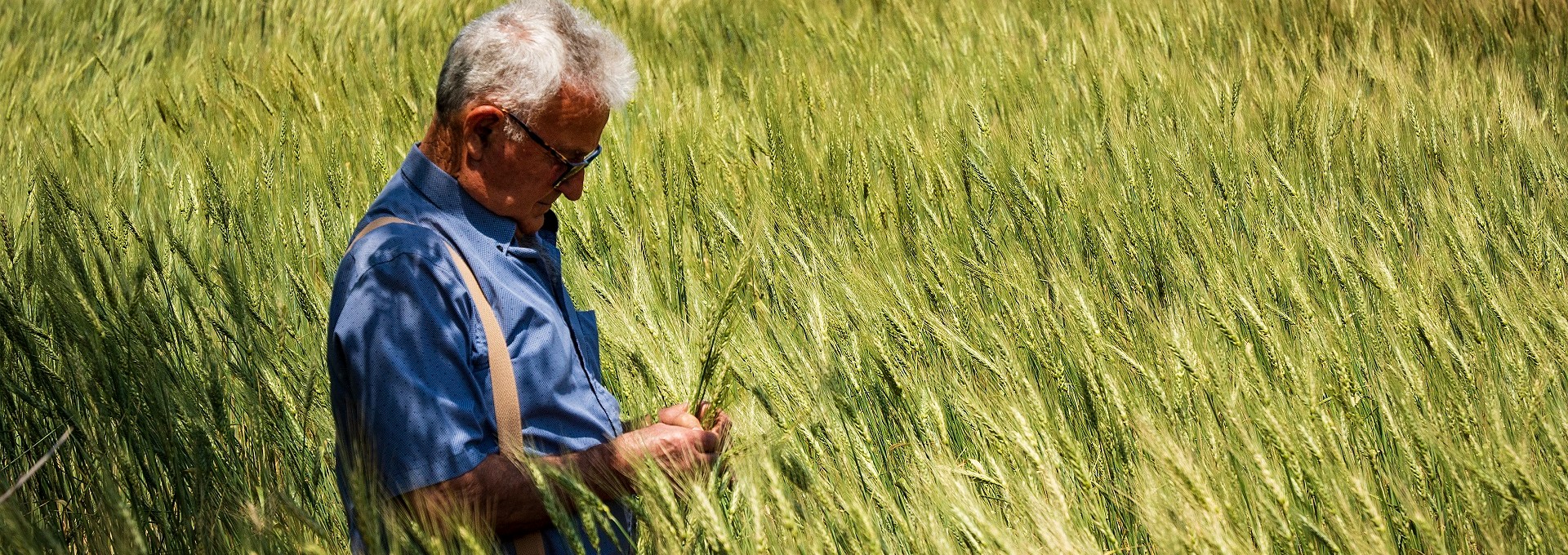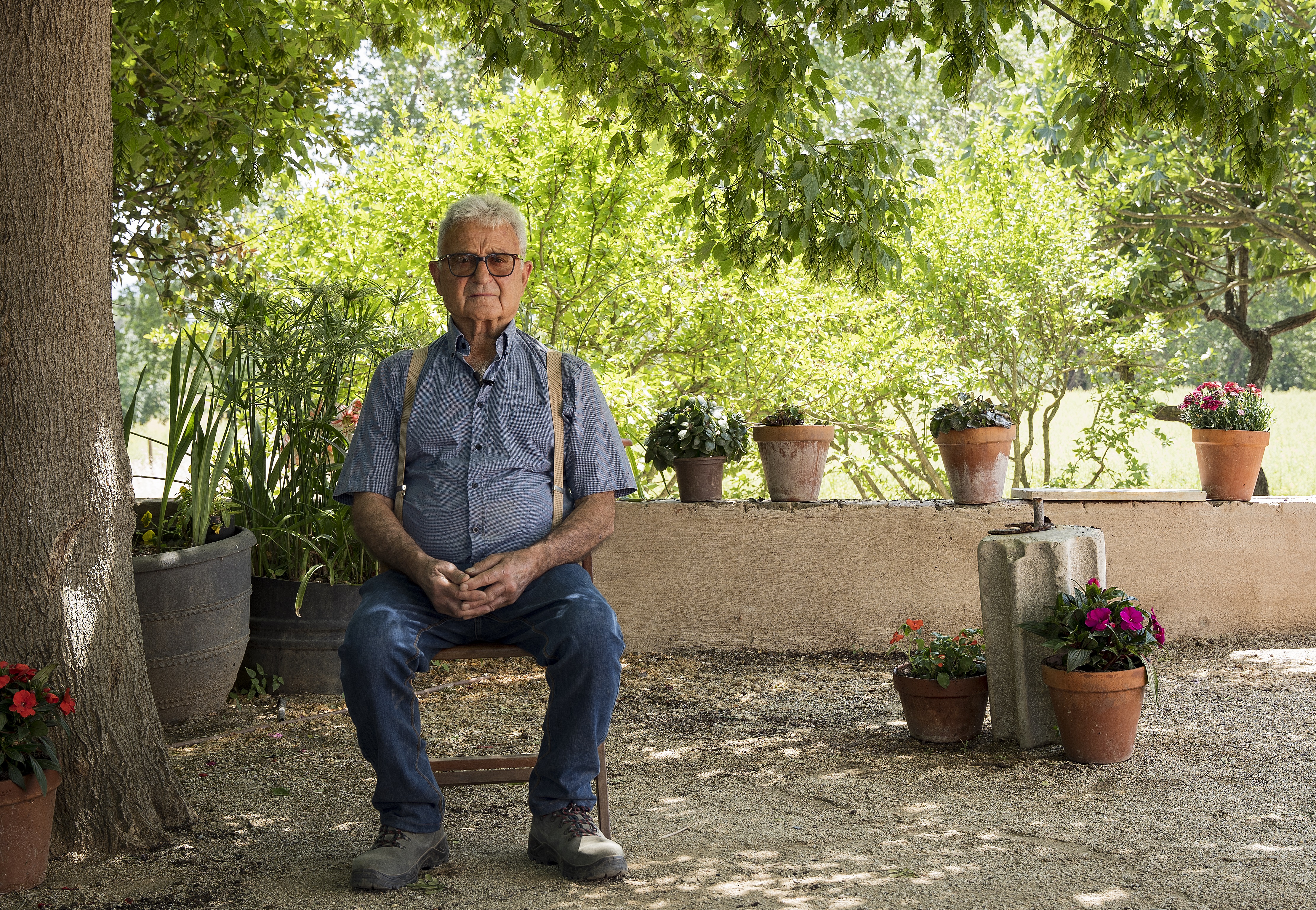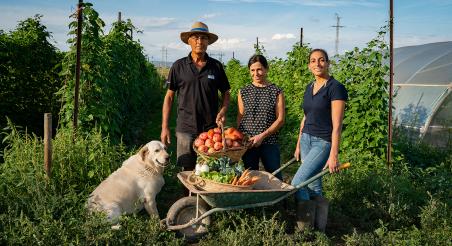Salvi Safont is a true expert on the Gallecs Rural Space, which he knows like the back of his hand. This hand, which feels strong when we shake it, is marked by small furrows that bring to mind the countless hours he’s dedicated to working the land. Salvi was born in 1945 in the farmhouse that comes into view just before the turn of the road that leads to the building of the Consorci de Gallecs (Gallecs Consortium), the body responsible for managing this 733-hectare rural space. The consortium is administered by the Government of Catalonia (through the Ministry of Territory and Sustainability, and the Ministry for Climate Action, Food and Rural Agenda) and the local councils of the municipalities of Mollet del Vallès, Santa Perpètua de Mogoda, Palau-solità i Plegamans, Parets del Vallès, Lliçà de Vall and Montcada i Reixac. Seventy-five percent of the surface area of Gallecs is used for agricultural activities, 14% is occupied by forests and the rest is made up of buildings, allotments, green areas and a 30-kilometre network of paths that make this corner of Vallès Oriental a leisure paradise. «This is a superb location for reaching a large number of consumers,» remarks Salvi. With more than 200,000 inhabitants in the four closest municipalities, this area is highly prized by residents looking for natural spaces, away from urban expansion. Its proximity to Barcelona is an additional advantage.
Despite his age, Salvi still loves working in the fields, which he’s been doing since he was 16 years old. After completing studies in commerce and bookkeeping, his father asked him if he could lend a hand with the farming work. «I could have done other things, but I’ve never regretted it!» he says.
«I could have done other things, but I’ve never regretted it!» Salvi Safont
Nowadays, Salvi manages an agricultural company that’s been certified by the Catalan Council for Organic Agricultural Production since 2006. The transition to organic farming began when the agronomist Gemma Safont – one of his three daughters – joined the Gallecs Consortium in the 2000s. Gemma is now its manager. «She was the one who convinced us to shift from grain crop monoculture to growing organic crops for human consumption,» he explains. They took her advice and incorporated six or seven old grain varieties, including Khorasan wheat, spelt and Florence Aurora wheat. They were even bold enough to revive Montjuïc wheat, which was created in Caldes de Montbui area during the period of the Second Spanish Republic. «Old grains are hardier and adapt better. Montjuïc wheat, for instance, always thrives because it’s a local crop. And the most amazing thing is that I actually grew it when I was little!» he exclaims.
«Old grains are hardier and adapt better» Salvi Safont
The grain cultivation and processing cycle at Can Salvi comprises various stages. After being harvested, the grain is stored in silos. «It’s crucial to keep organic produce clean, for which purpose we use many different machines. I’ve got all kinds of them on the farm,» explains Salvi. This is where Santi Olivé, of the Hereus de Can Jornet farming company, comes in. He forms part of the same Agricultural Processing Company (APC) as Salvi and he’s in charge of milling the grain and selling the flour. They prefer to sell any surplus themselves. As Salvi says, direct sales are the jewel in the crown. What’s more, the consortium has a farm shop where they can also sell their products. Can Salvi often supplies school canteens with legumes. The APC also manages a shared food production facility, and Salvi is a member of the Gallecs Farmers’ Association, which was set up in the year 2000.
The number of farmers in the area has been decreasing; there are currently around twelve of them. «Farmers always love the land; it’s the last thing they leave. Even if you work in other sectors, the land is always calling you, and you end up being out in the fields seven days a week,» Salvi muses. He’s certainly no exception. For 20 years he combined farming with a career in public works at the Catalan Land Institute (INCASÒL). He had a team of men who, in addition to carrying out works at the airport and other sites, provided agricultural services. They worked well together in the planting season. Salvi thinks that despite the complexities involved, farming has given him fewer headaches than public works. He sees working the land as a kind of «genetic bug”, of which he’s a carrier. Nowadays, his farming work is more solitary. In the early days, he owned around 13 or 14 hectares of land, whereas now he has 50 or 60 hectares distributed across the Gallecs estate and a second one in Torroella de Fluvià.
The history of an agricultural and livestock family
Salvi’s family history straddles two counties: Vallès Oriental and Alt Empordà. His grandfather, after whom he was named, moved to Gallecs a century ago from Castelló d’Empúries. In the 1920s, it was easier to make a living from farming in the Barcelona area than in Empordà, which is how he managed to become the tenant farmer of a plot of land next to the church in Gallecs. In 1933 he decided to buy the estate and, with the help of his sister, completed the construction of the farmhouse. After the Spanish Civil War, Salvi’s father, who had been part of the Quinta del Biberón (the «Baby Bottle Draft» of very young soldiers who fought for the Republican cause), bought a threshing machine and a tractor to get the family farming business up and running. «We’ve always been an innovative bunch,» says Salvi.
«We’ve always been an innovative bunch» Salvi Safont
In 1971, towards the end of Franco’s dictatorship, the family experienced the same plight as many other farmers when the Spanish Ministry of Housing expropriated its land in Gallecs. The family was forced to return to its roots in Empordà. Although they received less money for their expropriated land than other farmers who took their cases to court, they quickly made the decision to acquire a farm in Torroella de Fluvià, in the county of Alt Empordà, which they named Can Salvi. The family initially intended to move the cows from Gallecs up north, but there was a last-minute change of plan. When Franco died, the Spanish government returned the Gallecs land to the Catalan authorities and it was placed in the hands of the Catalan Land Institute.
Salvi Safont recalls the hardship of his youth: «When I was sixteen or seventeen, people would look at us young farmers as if we were foxes and women would turn away from us.» The word “farmer” was used as an insult. Salvi was shunned and made to feel unwelcome, especially in leisure venues. But everything’s different in the 21st century. «Nowadays, farmers are kings of the hill!» he exclaims.
«When I was sixteen or seventeen, people would look at us young farmers as if we were foxes and women would turn away from us. Nowadays, farmers are kings of the hill!» Salvi Safont
When he was 24 years old, Salvi married Joana, a hairdresser from Barcelona, who quit her job to embrace a new life by his side. «I’m grateful to my wife for everything she’s done. She left Barcelona to come and live here, with no telephone or car... She’d milk the cows, castrate the pigs, give milk to the calves, take the girls to school...», he says, admiringly. He feels lucky to have a wonderful team in his wife and three daughters.
The family continued its livestock activity until 1992, despite restrictions on the sale of fresh milk. They grew alfalfa and other forage crops for the cows on irrigated land in Empordà, while the Gallecs farm was essential for sales. When he wound up his livestock faming business, Salvi went into partnership with a colleague, providing agricultural services for third parties. After some time, the partner left the business.
The struggle for Gallecs
Gallecs today is a mosaic of dryland farming areas, vegetable gardens and forest. However, Salvi recalls how hard its residents had to fight to achieve this result. The construction of a city had been planned in the 1970s. In response, a committee for the protection of the rural space was created in 1977, culminating in a mass protest the following year. After the expropriation, Salvi recalls with great sadness a period marked by the insecurity arising from the threat to the cropland and people of Gallecs. «In 1984 there was no law, the space belonged to everyone, and people would come and occupy land. They’d come with their flocks and start up vegetable gardens without permission.»
Eventually, INCASÒL and the municipalities of Mollet del Vallès and Santa Perpètua de Mogoda granted farming permits to farmers who cultivated land in Gallecs at that time. Salvi explains that they were six-month permits, which limited farmers’ ability to rotate crops, but at least some sort of regulation had been introduced.
Salvi is satisfied with the current state of affairs in Gallecs: the space is respected and enjoyed by many residents from the neighbouring towns. «Everyone loves Gallecs and they tell us that if there are ever any plans to build on it, we farmers will have their support,» he tells us, bursting with pride.
«Everyone loves Gallecs and they tell us that if there are ever any plans to build on it, we farmers will have their support» Salvi Safont
A calling to share his experience
Salvi’s many adventures and experiences have shaped his character, leaving him with a desire to share all his knowledge. In addition to facilitating the transition towards organic farming, the Gallecs Consortium also has an area dedicated to environmental education, which serves as a teaching resource. Salvi takes part in the activities of the educational plan, which include welcoming students on internships of the Master's Degree in Ecological Agriculture of the University of Barcelona. This allows him to share his know-how on organic farming, as well as to cultivate experimental plots of land for the university.
When Salvi thinks about the future of his farming estate, his ten-year-old grandson quickly comes to mind. He thinks the young lad has «the same bug» and passion for the land as himself. «You won’t find what your grandad’s telling you in books! I’ve seen that for myself with the master’s degree students,» he tells the boy when he passes on some of his knowledge to him.
For some time now, the guiding philosophy at Can Salvi has been the need to change the agriculture and livestock farming model. Salvi recently attended a conference on weeding machines and was surprised to discover that they’d been using them on the farm for five or six years. «In meetings they always ask me to share my experiences, but the truth is that we’ll never know enough and we’ll always be checking the sky!» he says.
He sees organic farming as the natural way to grow crops. In the early days, they ploughed with horses on the farm, like in Roman times, and did everything by hand. What’s more, there were no synthetically created fertilisers, which became popular during the so-called Green Revolution. Salvi explains that they started growing more wheat at that point, but of inferior quality. He has a theory about the advent of intensive farming. «If we’d carried on eating old wheat varieties, maybe there wouldn’t be so many gluten-intolerant people. Because both you and I are earth and our bodies reject manipulated products,» he says.
«If we’d carried on eating old wheat varieties, maybe there wouldn’t be so many gluten-intolerant people. Because both you and I are earth and our bodies reject manipulated products» Salvi Safont
At Can Salvi, they currently rotate crops, alternating between grains and legumes. This practice was followed when Salvi was a child and was considered essential: «Crop rotation was set in stone,» he says. Since they no longer have their own livestock on the farm, they’ve purchased a composter that processes manure from nearby farms, which they then apply to the fields.
The lack of generational renewal
The lack of generational renewal in the primary sector is a source of concern for Salvi. In the Gallecs Rural Space, he regrets the demise of Rave Negre (Black Radish), a project started up by two women which he says was going well. He values the power of women in the profession and thinks that they’re very astute and sensitive. Salvi advises people starting out in farming to be patient and to be aware, right from the start, that they really need to enjoy farming. «It’s a very hard job because you don’t make money. If more money was made by farmers, more people would be willing to enter the profession.»
Looking at farming in general, Salvi identifies several concerns. First, he complains about how large supermarket chains squeeze producers, leaving them with small profit margins. At the same time, investors from all over the world are buying up land and devaluing or ruining small and medium-sized local projects, implementing commercialisation processes with which they can’t compete. By way of example, he tells us about some farming friends from the Empordà area who, for a time, sold their apples to a supermarket chain. One day, it demanded a price cut, which they weren’t willing to accept, so it replaced them with other suppliers. Over the course of the business relationship, they’d made investments to expand the cooperative, but now they had no customer. Salvi considers that so-called livestock integration contracts are another detrimental factor for small farmers, since the concentration of power takes away independence from everyone else.
Faced with the reality of ageing farmers, Salvi believes it’s essential to promote generational renewal, although he acknowledges that it’s no easy task. «Nowadays, starting a farm is extremely complicated. A young person has to find land, and leases are very expensive for various reasons, but especially because land is being used to dump liquid manure,» he explains. Furthermore, setting up a farm with the minimum amount of machinery is an expensive business. When you crunch the numbers, you see that the profit margin will be small.
Turning to generational renewal in Gallecs, Salvi explains that this is a critical period for the rural space. The licences granted in the 1980s are up for review and have to be regularised. What’s more, the new concession will allow other activities to be carried out, such as rural tourism. Salvi’s convinced that farming has always been able to adapt and diversify in order to succeed. He’s well aware of the fact that alternatives must be sought to ensure the continuity of the sector.
We ask Salvi to take stock of his career as a farmer: «I think I have a good life,» he says. «The process of preparing a field for sowing, planting the seeds, tending to the field and watching them grow is magical. It’s like looking after a baby: if you prepare the crib with a warm blanket, the baby will be comfortable and that’s a joy!» In fact, he fondly recalls the time when they had the cow farm, when every calf born felt like a child of his own. But he’s happy with the work he does now and doesn’t miss the animals because he’s been able to enjoy more holidays. Every year he tries to get away somewhere with his wife, the lady from Barcelona who’s always been by his side.
— BCN Smart Rural Editorial —




